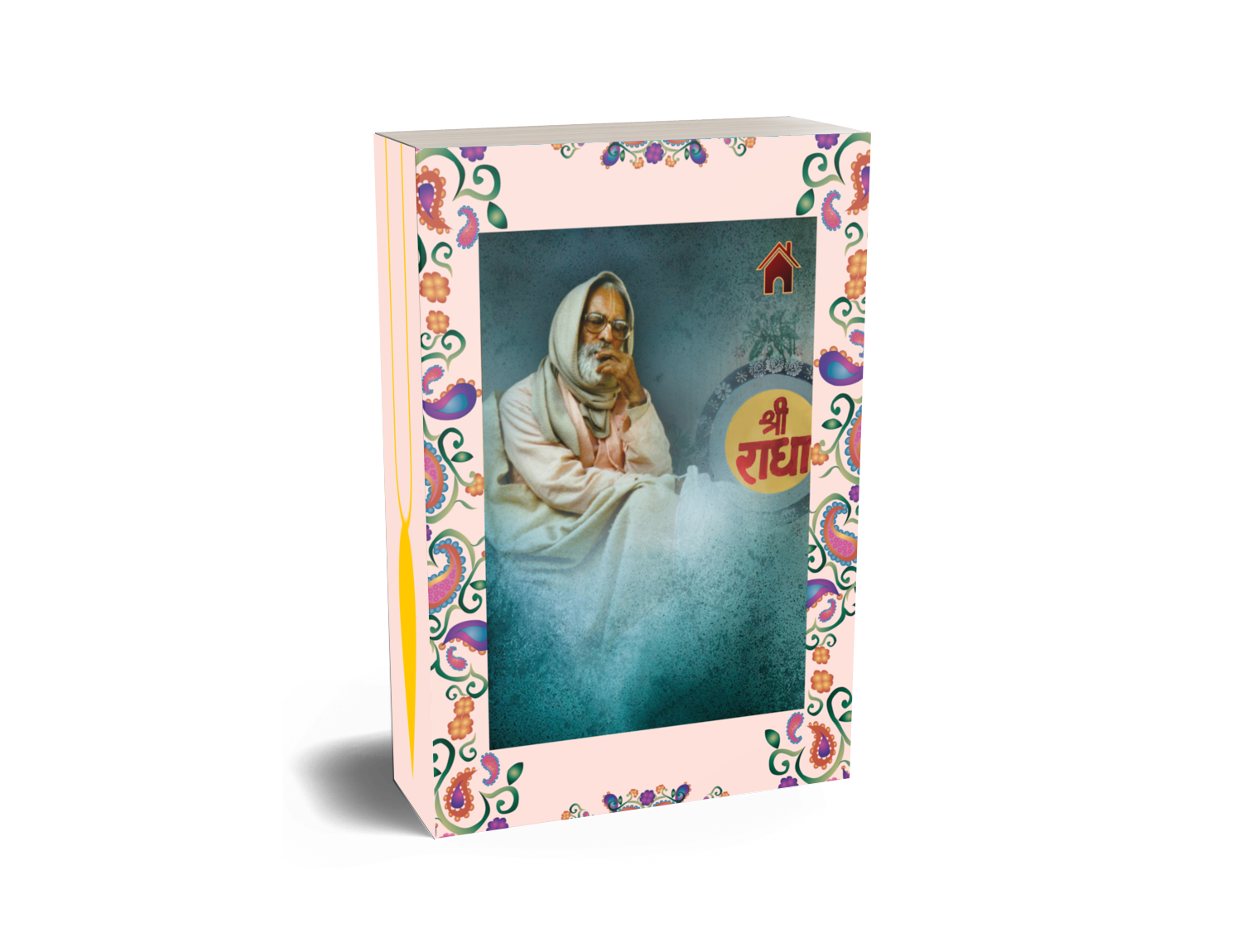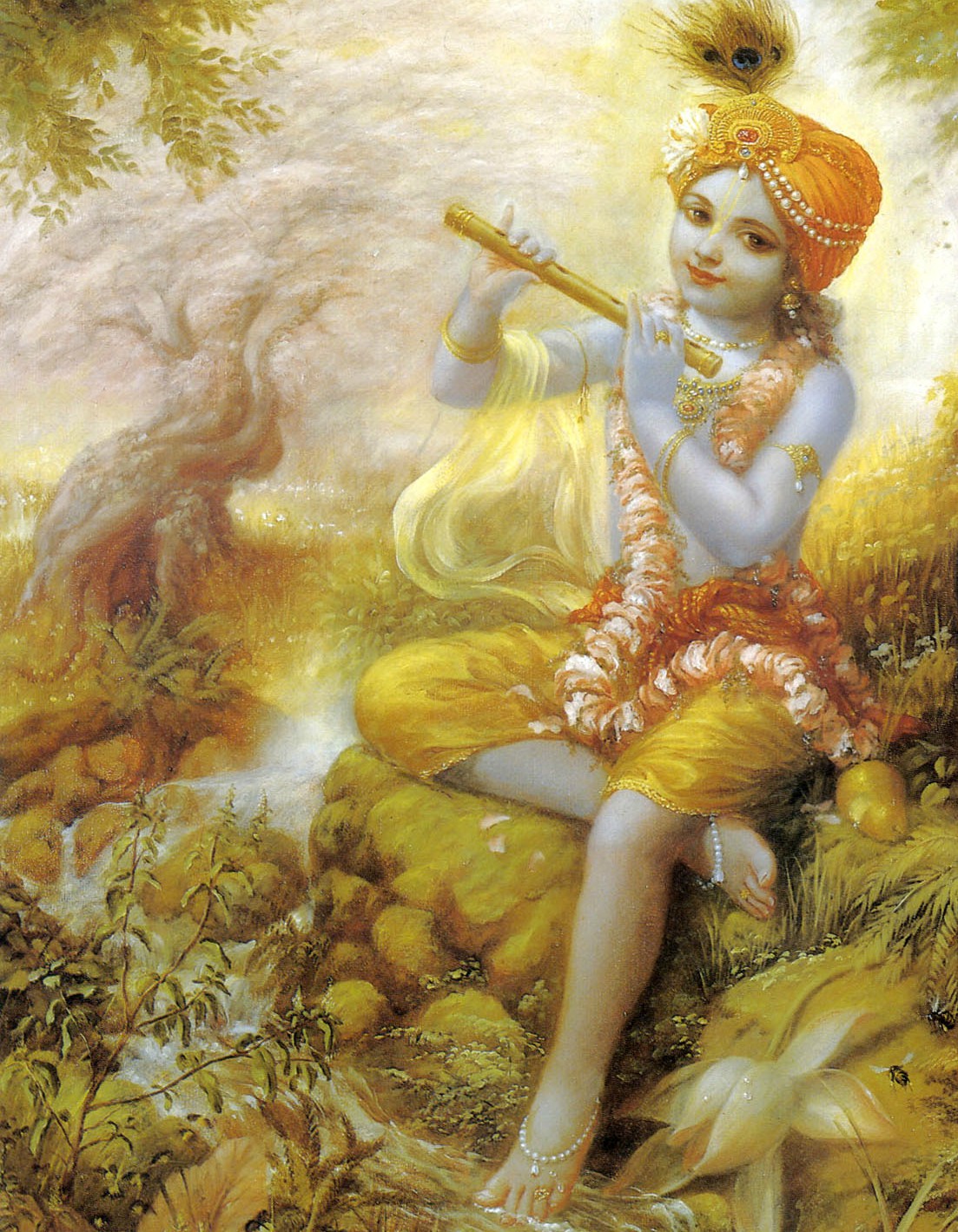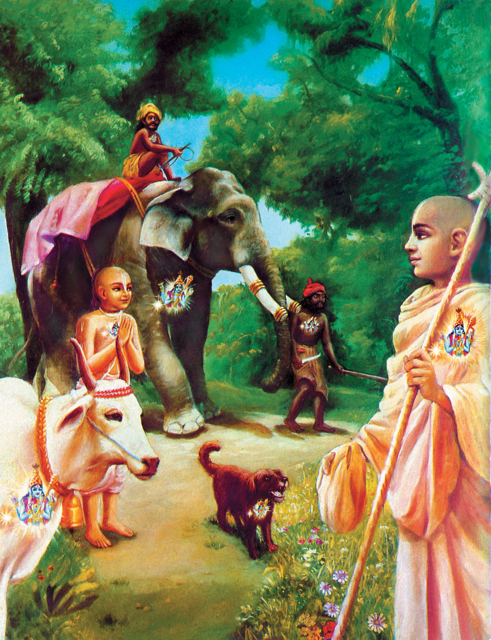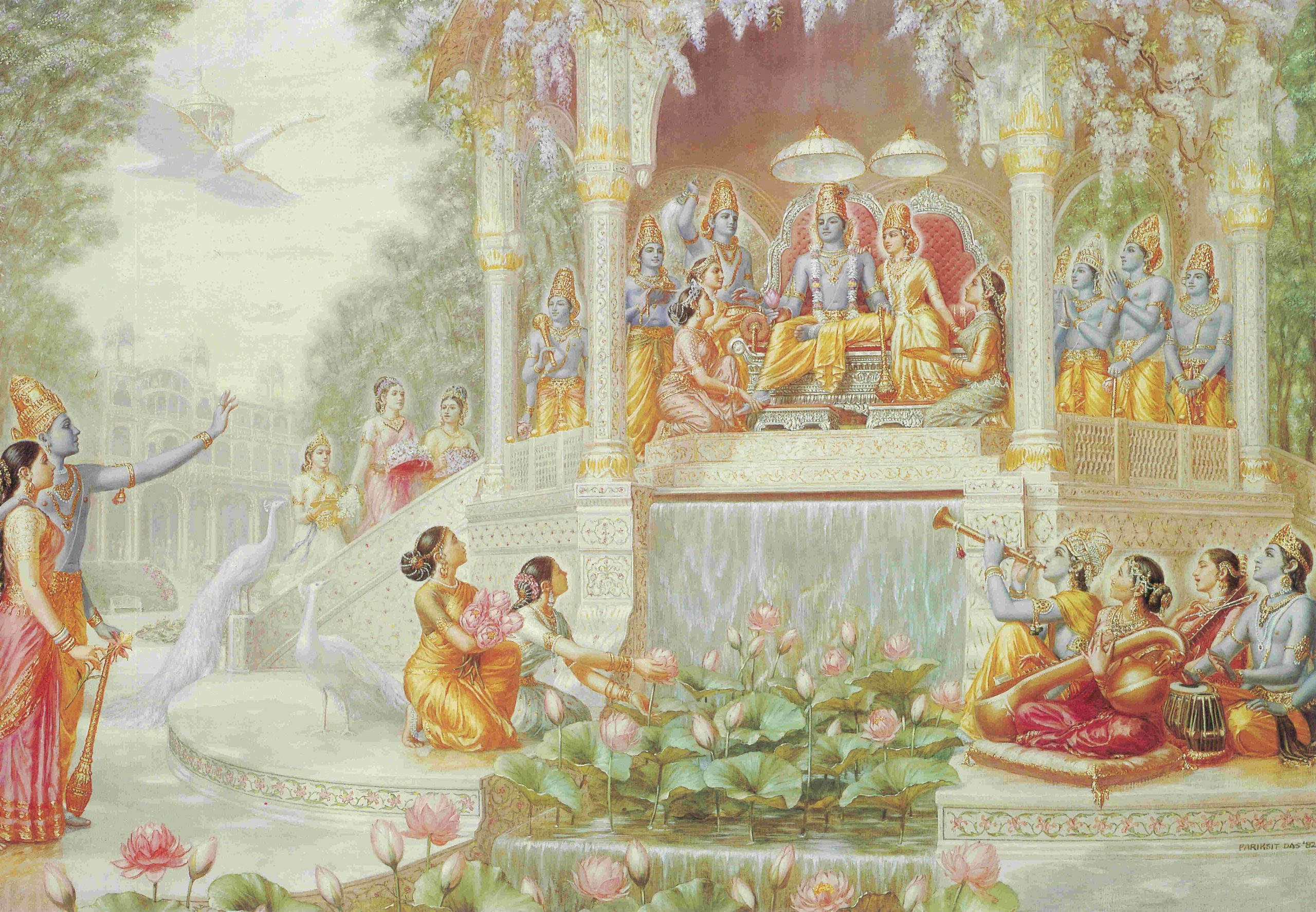
An excerpt from a morning walk with Śrīla Bhaktivedānta Nārāyaṇa Mahārāja in Frielendorf, Germany, on July 13, 2007, published in Walking with a Saint – Morning Walks and Conversations 2007
Malati dāsī (from France): Gurudeva, Tāruṇī is leaving this morning to go back to Canada.
Śrīla Bhaktivedānta Nārāyaṇa Mahārāja: (To Tāruṇī dāsī) Oh, my blessings are with you.
Paramānanda dāsa: Gurudeva, this is Dwayne and Ian from Northern Ireland. They came to see you.
Śrīla Bhaktivedānta Nārāyaṇa Mahārāja: Have they heard our classes?
Paramānanda dāsa: Yes, they heard last night.
Śrīla Bhaktivedānta Nārāyaṇa Mahārāja: (To the guests) Be happy by chanting and remembering the Lord.
There is no need to make worldly plans for the future. There is no need to think, “We don’t know what will happen after Mahārāja leaves this world. We should make a separate arrangement for our future so that we can be peaceful.”
Don’t think like this. Think only about how to attain kṛṣṇa-prema; how to attain sajātīya snigdha āśaya, the association of pure devotees who are affectionate to you and who are oceans of the transcendental mood for which you aspire. Best to mould your life only around this, and thus make your life successful. Don’t worry, thinking, “Oh, what will be our future after Mahārāja leaves this world? We should do something separate for our welfare.” What you propose, God will dispose of. So, no need to worry.
Śrīpāda Śuddhādvaitī Mahārāja: Śrīla Gurudeva, some devotees are asking that at the time of dīkṣā initiation you say that we should take Kṛṣṇa as our priyatama, our most beloved. But, since Śrīmatī Rādhikā is already Kṛṣṇa’s beloved, how can we take Him as our beloved?
Śrīla Bhaktivedānta Nārāyaṇa Mahārāja: This is the meaning of gopī-jana-vallabha: Kṛṣṇa is the beloved of all  the gopīs. You can think of this in the way that Rūpa Mañjarī or Rūpa Gosvāmī thinks. You can follow Rupa Gosvāmī in his sādhaka form, as well as in his form as the gopī, Rūpa Mañjarī.
the gopīs. You can think of this in the way that Rūpa Mañjarī or Rūpa Gosvāmī thinks. You can follow Rupa Gosvāmī in his sādhaka form, as well as in his form as the gopī, Rūpa Mañjarī.
Gauracandra dāsa (from England): Gurudeva, if I chant my japa in front of the Deities in the temple, should I meditate more on Kṛṣṇa or Rādhārāṇī?
Śrīla Bhaktivedānta Nārāyaṇa Mahārāja: Both. They are the Divine Couple.
Rāma dāsa (from Germany): Śrīla Gurudeva, I would like to show you a picture from my magazine. I made an announcement in it for your Bhakti-Yoga Festival.
Śrīla Bhaktivedānta Nārāyaṇa Mahārāja: For this festival?
Rāma dāsa: Yes, it was for this festival, and it brought some people. I wrote an article, and in the article I made a  small presentation about the meaning of bhakti-yoga.
small presentation about the meaning of bhakti-yoga.
Śrīla Bhaktivedānta Nārāyaṇa Mahārāja: Very good, very good. How many people read the magazine?
Rāma dāsa: It has a print run of 5,000. It comes out four times a year. It has more than 5,000 readers because two, three, or four people are reading each copy.
Śrīla Bhaktivedānta Nārāyaṇa Mahārāja: Very good. Śrīla Bhaktivinoda Ṭhākura, Śrī Gurupādapadma (Śrīla Bhakti Prajñana Keśava Gosvāmī Mahārāja), and Śrīla Sarasvati Ṭhākura also published magazines.
Rāma dāsa: I regularly do one article with some pictures and information about you. (Showing a photo in the magazine) I think this is a very nice picture of you.
Śrīla Bhaktivedānta Nārāyaṇa Mahārāja: Very good.
Śrīpāda Āśrama Mahārāja: Śrīla Gurudeva, regarding what you just said about not making future plans – plans for after you leave…
Śrīla Bhaktivedānta Nārāyaṇa Mahārāja: Make plans only for sādhu–saṅga. You can plan how to be successful by sādhu-saṅga, and how to attain kṛṣṇa-prema. Your whole attention must be on that. Don’t think, “When Mahārāja is no longer in this world, what to do?
I don’t know what will happen. I don’t know what will happen to the saṅga. So, from right now, I should try to create something separate so that I can be very happy and peaceful.” Don’t think like that. Rather, place your whole attention on Kṛṣṇa consciousness. I was telling only this.
Śrīpāda Āśrama Mahārāja: I have a personal question in that regard. I am developing a project for Vaiṣṇava studies that is separate from the group in Birmingham, but I am also still working with the group. I am not thinking about the future in the way you just described, because my mind is not on possession of property. I actually don’t care about that.
Śrīla Bhaktivedānta Nārāyaṇa Mahārāja: I think this project should be for everyone. Everyone with projects should think, “This is not my own property. Rather, it is a bhakti project.”
Śrīpāda Āśrama Mahārāja: This is a bhakti project, but it is also specific.
Śrīla Bhaktivedānta Nārāyaṇa Mahārāja: And at the same time everyone should think, “This is my maṭha.” You can consider your project in this way.
Vrajanātha dāsa: Mahārāja desires to train devotees who want to become dedicated brahmacārīs and sannyāsīs.
Śrīla Bhaktivedānta Nārāyaṇa Mahārāja: In Mathurā, in Vṛndāvana, and everywhere else we are teaching everyone, “Oh, you stand up [and speak], and you stand up. We do this together, with hundreds and thousands of devotees. Why can’t you do it this way?
Śrīpāda Āśrama Mahārāja: I want to do it differently, but if you want me to do it this way, I will do it. I have no problem.
Śrīla Bhaktivedānta Nārāyaṇa Mahārāja: Do what is favourable for you. I expressed my desires, but everyone is independent to do as they like. Even Kṛṣṇa cannot take away your independence.
Śrīpāda Āśrama Mahārāja: I will do as you desire; no problem.
Śrīla Bhaktivedānta Nārāyaṇa Mahārāja: This instruction is not only for you. It is for all. Our whole attention should be on how we can achieve kṛṣṇa-prema.
Śrīpāda Sādhu Mahārāja: Gurudeva, sometimes we preach to Christian people, after which they become  attracted to Kṛṣṇa consciousness, come to your lotus feet, and take initiation. Still, they sometimes think that Jesus, or Īśa, is God, and not the son of God. What would you recommend for the development of their Kṛṣṇa consciousness?
attracted to Kṛṣṇa consciousness, come to your lotus feet, and take initiation. Still, they sometimes think that Jesus, or Īśa, is God, and not the son of God. What would you recommend for the development of their Kṛṣṇa consciousness?
Śrīla Bhaktivedānta Nārāyaṇa Mahārāja: You can tell them, “Kṛṣṇa and Christ are the same. We are pure Christians – more so than those who falsely proclaim themselves as Christians. We don’t eat cows, beef, or any other animal food. The Supreme Lord, Christ, has not created the animals for us to eat. We devotees follow all the principles of the Bible. You should also follow, and become pure.”
Śrīpāda Sādhu Mahārāja: They think that Jesus, Īśa, is the Supreme Lord. They think that he is viṣṇu-tattva. How shall we explain that he is the son of God?
Śrīla Bhaktivedānta Nārāyaṇa Mahārāja: Christ is Kṛṣṇa. Christ, Christos, Krusta, Kṛṣṇa.*
Śrīpāda Sādhu Mahārāja: So, Jesus is the son of Kṛṣṇa.
Vrajanātha dāsa: Yes, Jesus is the son of Christ.
Śrīpāda Mādhava Mahārāja: Jesus never proclaimed, “I am God.”
Ananta-kṛṣṇa dāsa (from Lithuania): May I ask a question? I serve in the Russian Orthodox Church in Lithuania. I have a relationship with my priest, and I have a very good feeling when I serve him. May I serve him after taking initiation from you?
Śrīla Bhaktivedānta Nārāyaṇa Mahārāja: If he is against God, Kṛṣṇa, then don’t serve there.
Ananta-kṛṣṇa dāsa: No, he is not against Kṛṣṇa. When I asked his permission to come here, he said, “Go. I bless you.”
Śrīla Bhaktivedānta Nārāyaṇa Mahārāja: If he is favourable, you can do some service there. (To Padmanābha Mahārāja) Do you remember the śloka beginning [with] duḥkheṣv anudvigna-manāḥ?
Śrīpāda Padmanābha Mahārāja:
duḥkheṣv anudvigna-manāḥ
sukheṣu vigata-spṛhaḥ
vīta-rāga-bhaya-krodhaḥ
sthita-dhīr munir ucyate
Bhagavad-gītā (2.56)
[One who is not disturbed by the three types of miseries – given by one’s own body or mind, given by others, and given by the demigods or nature – who remains free from hankering in the presence of plentiful opportunities for sensual happiness, and who is free from attachment, fear, and anger, is called a sage of steady mind.]
Śrīla Bhaktivedānta Nārāyaṇa Mahārāja: What is the meaning?
Śrīpāda Padmanābha Mahārāja: Duḥkheṣv anudvigna-manāḥ – In any situation, a devotee should not be affected by distress or suffering (dukha). Sukheṣu vigata-spṛhaḥ – He should not desire happiness. He should not be attached to happy situations.
Śrīla Bhaktivedānta Nārāyaṇa Mahārāja: This refers to worldly happiness, not transcendental happiness.
Śrīpāda Padmanābha Mahārāja: Worldly happiness. Vīta-rāga-bhaya-krodhaḥ – The devotee is detached from everything in this world. Bhaya – He is free from all kinds of fear. You were just saying that we shouldn’t worry about what will happen in the future. Krodha – He is free from anger, and frustration. Sthitadhīr munir ucyate – Kṛṣṇa is describing the qualities and nature of someone who is perfectly situated in transcendental consciousness, or Kṛṣṇa consciousness.
Śrīla Bhaktivedānta Nārāyaṇa Mahārāja: (To Śrīpāda Nemi Mahārāja) Please recite the verse beginning [with] tat te ‘nukampam.
Śrīpāda Nemi Mahārāja:
tat te ’nukampāṁ su-samīkṣamāṇo
bhuñjāna evātma-kṛtaṁ vipākam
hṛd-vāg-vapurbhir vidadhan namas te
jīveta yo mukti-pade sa dāya-bhāk
Śrīmad-Bhāgavatam (10.14.8)
[A person is entitled to the treasure of serving the lotus feet of Godhead, who redeems us of our worldly bondage, if he lives with his heart, speech and body submitted to Him and if, through his good vision, he truly sees the mercy of Godhead in the sufferings he brought about by his own deeds. There is no other way of being delivered from this world. Whatever Godhead does is for our good. We can be redeemed if we behold His mercy in every event and in every activity. But if we notice any defect in His work, or realise any cruelty therein, it is sure to result in evilness and difficulty.]
Śrīla Bhaktivedānta Nārāyaṇa Mahārāja: What is the meaning?
Śrīpāda Nemi Mahārāja: If some suffering comes to a devotee, that devotee thinks it is a result of his previous activities; Kṛṣṇa is now giving a very, very little token punishment for those activities.
Śrīla Bhaktivedānta Nārāyaṇa Mahārāja: Kṛṣṇa gives us suffering so that we will become detached from this world. That is His mercy.
Śrīpāda Nemi Mahārāja: Hṛd-vāg – He offers obeisances with his heart, with his words, and with his body. Jīveta yo mukti-pade sa dāya-bhāk – For one who lives in this way, the lotus feet of Kṛṣṇa are his rightful inheritance. This cannot be taken away from him.
Śrīla Bhaktivedānta Nārāyaṇa Mahārāja: If someone is abusing you, why should you not become angry?
Śrīpāda Nemi Mahārāja: I can think that this is the result of my previous karma. It is not that that person is doing something to me. Kṛṣṇa is doing something to me, and this person is simply the instrument or the carrier. I can’t oppose what is happening. If I try to oppose it, it will come to me from somewhere else, or from some other person.
Śrīla Bhaktivedānta Nārāyaṇa Mahārāja: Yes, always think like that. If someone is tearing a piece of paper,  should you become angry?
should you become angry?
Śrīpāda Nemi Mahārāja: Tearing my paper? I don’t understand.
Śrīpāda Sādhu Mahārāja: You are like the paper.
Śrīpāda Mādhava Mahārāja: If someone is tearing an insignificant piece of paper, will you be angry, or not?
Śrīla Bhaktivedānta Nārāyaṇa Mahārāja: Will you be angry?
Śrīpāda Nemi Mahārāja: There is no need to be angry.
Śrīla Bhaktivedānta Nārāyaṇa Mahārāja: The tearing of the paper is a useless thing. Similarly, we may see  many things in this world that we may consider to be the cause of our anger, but they are all like dreams. After a dream is over, we say, “Oh, nothing happened.” So, we need not be angry. By considering things in this way, we will be able to do bhajana successfully.
many things in this world that we may consider to be the cause of our anger, but they are all like dreams. After a dream is over, we say, “Oh, nothing happened.” So, we need not be angry. By considering things in this way, we will be able to do bhajana successfully.
Śrīpāda Padmanābha Mahārāja: In Badger last year, you were speaking from the Eleventh Canto of Śrīmad-Bhāgavatam. You were telling us about the Avantī brāhmaṇa. You explained how people used to come and urinate on his head, spit at him, and pass stool in his kamaṇḍalu (waterpot).
Śrīla Bhaktivedānta Nārāyaṇa Mahārāja: Yes.
Śrīpāda Padmanābha Mahārāja: The Avantī brāhmaṇa was not disturbed by this, because he understood, “These circumstances have come from my own previous activities, so I must tolerate them.”
Śrīla Bhaktivedānta Nārāyaṇa Mahārāja: Try to follow this understanding, and then you will be happy and able to do bhajana of Kṛṣṇa. Be niṣkāma, free from material desires. Desire only love and affection for Kṛṣṇa, nothing else; then you will not be disturbed. Don’t disturb anyone, and don’t be disturbed by anyone.
Śrīpāda Padmanābha Mahārāja: Śrīla Gurudeva, regarding this same verse, duḥkheṣv anudvigna-manāḥ, sukheṣu vigata-spṛhaḥ, when we discuss this topic, many devotees say it is easier for them to be surrendered when misery or suffering comes, but what about when happiness comes? They say that when happiness comes, they become too much attached to it.
Śrīla Bhaktivedānta Nārāyaṇa Mahārāja: After all, it is worldly happiness. There is no use for worldly happiness. Only kṛṣṇa-bhakti is of value. Our only happiness should be in the opportunity for svajātīya snigdha asaya sādhu-saṅga (the association of those Vaiṣṇava sādhus who are situated in the goal we want to attain and who are affectionate to us).
Śrīpāda Āśrama Mahārāja: Śrīla Gurudeva, practically speaking, in my practical situation…
Śrīla Bhaktivedānta Nārāyaṇa Mahārāja: Do whatever is favourable. Don’t waste time.
Sat-prema dāsa: Gurudeva, how is it that Śrīyā Śuka (Śrīmatī Rādhikā’s parrot) merged in Brahman (the impersonal light emanating from Śrī Kṛṣṇa’s divine form, or the impersonal conception of the Absolute Truth) after being with Rādhārāṇī?
Śrīla Bhaktivedānta Nārāyaṇa Mahārāja: What?
Śrīpāda Padmanābha Mahārāja: He is saying that when Śrīla Śukadeva Gosvāmī was in the womb of his  mother, he was in Brahman realization or impersonal realization. He is asking how it is possible that the parrot of Śrīmatī Rādhikā can be reduced to the stage of impersonal realization.
mother, he was in Brahman realization or impersonal realization. He is asking how it is possible that the parrot of Śrīmatī Rādhikā can be reduced to the stage of impersonal realization.
Śrīla Bhaktivedānta Nārāyaṇa Mahārāja: He did this to show that even a brahmavādī, a brahma-realized soul, can become a bhakta. He did this only as an outward show.
Paramānanda dāsa: Gurudeva, when the body of the conditioned soul is burnt to ashes (cremated) after death, how important is it that his ashes go into the Yamunā and Ganges Rivers, and what is the destination of that soul whose ashes get that opportunity?
Śrīpāda Padmanābha Mahārāja: Suppose a devotee is living in a foreign country and cannot bring the ashes to the Yamunā or Ganges. How important is it to do this?
Śrīla Bhaktivedānta Nārāyaṇa Mahārāja: If one is unable to place those ashes in the Ganges, he will not do  so; but if one has the opportunity to do so, it is very good. They will begin or develop in their spiritual path, they will engage in sādhana-bhajana, and then they will go to Vaikuṇṭha.
so; but if one has the opportunity to do so, it is very good. They will begin or develop in their spiritual path, they will engage in sādhana-bhajana, and then they will go to Vaikuṇṭha.
Devotee: In the Tenth Canto of Śrīmad-Bhāgavatam we see so many chapters describing the ecstatic pastimes of Kṛṣṇa. We see in the Ninth Canto that there are chapter after chapter descriptions of dynasties and names of various kings. Should we see some differences, or no differences, between the different cantos? Should we see that all of Śrīmad-Bhāgavatam is transcendental? Should we consider all the parts of Bhāgavatam to be equally transcendental?
Śrīla Bhaktivedānta Nārāyaṇa Mahārāja: They are not equal. Up until the Ninth Canto, the instructions regarding the various histories are given to inspire us for renunciation – detachment from worldly things. We learn detachment from the histories of Purūravā and Purañjana and other kings, and then we become qualified to read the Tenth Canto.
The material world’s creation, maintenance, and destruction as described in the Second and Third Canto of Śrīmad-Bhāgavatam have been told only for this purpose – to inspire us for renunciation. Then, in the Eleventh Canto we learn from the many histories and instructions regarding the process to attain kṛṣṇa-prema. We are advised to follow all the instructions imparted therein.
Yogesh dāsa: This morning I was having a hard time waking up to come on your walk, but I suddenly  remembered Śrīla Prabhupāda’s words: “A moment’s association with a pure devotee is worth so much.” I wanted to understand this statement, so I ran here to find out the answer.
remembered Śrīla Prabhupāda’s words: “A moment’s association with a pure devotee is worth so much.” I wanted to understand this statement, so I ran here to find out the answer.
Śrīla Bhaktivedānta Nārāyaṇa Mahārāja: Oh, you are fortunate.
Śrīpāda Śrautī Mahārāja: You will be going to his house in Mauritius, so he will have your association there.
Śrīla Bhaktivedānta Nārāyaṇa Mahārāja: He is from Mauritius?
Śrīpāda Padmanābha Mahārāja: He is Yogesh Prabhu, a disciple of our Śrīla Prabhupāda.
Śrīla Bhaktivedānta Nārāyaṇa Mahārāja: I want to go to Mauritius. Can you help me?
Vrajanātha dāsa: You requested the devotees in Mauritius to make a festival like this there.
Śrīla Bhaktivedānta Nārāyaṇa Mahārāja: I want a festival like this. I also want to meet with the Prime Minister of Mauritius, to thank him that Indian culture is still being maintained in his country. (To all the devotees) Also, remember this: I explained in my class about Saubhari Ṛṣi. He cursed Garuḍa, and what became of him?
Devotee: He fell down.
Śrīla Bhaktivedānta Nārāyaṇa Mahārāja: He deviated. He developed lust in his heart and then approached King Māndhātā to marry his daughters. We must be always alert regarding offences to Vaiṣṇavas.
* An excerpt from Śrīla Bhaktivedānta Nārāyaṇa Mahārāja’s booklet, The Way of Love, which is based on his lecture, spoken at the famous Custard Factory in Birmingham, England, on June 14, 2003 :
“Jesus also taught this philosophy. He went to India when he was about sixteen years old, and he visited many places of pilgrimage, like Vṛndāvana, Ayodhyā, South India, and Jagannātha Purī. In Purī he saw the deities of Jagannātha, Baladeva, and Subhadrā, and he heard Lord Jagannātha (meaning “Lord of the Universe”) addressed as Kṛṣṇa. In this part of India, the name Kṛṣṇa is pronounced Kroosna. Because of different languages, Greek and Hebrew, this name became Kroosta, then Krista, and now it is pronounced Christ. Kṛṣṇa, Kroosna, Krista, and now Christ – they are the same.”
Source: Purebhakti.com
Image/Art made possible by Pixabay.com, Krishnapath.org and/or Bhaktiart.net
Unless indicated differently, all verse translations and quotes are from the books by Śrīla Prabhupāda (Vedabase.com)









